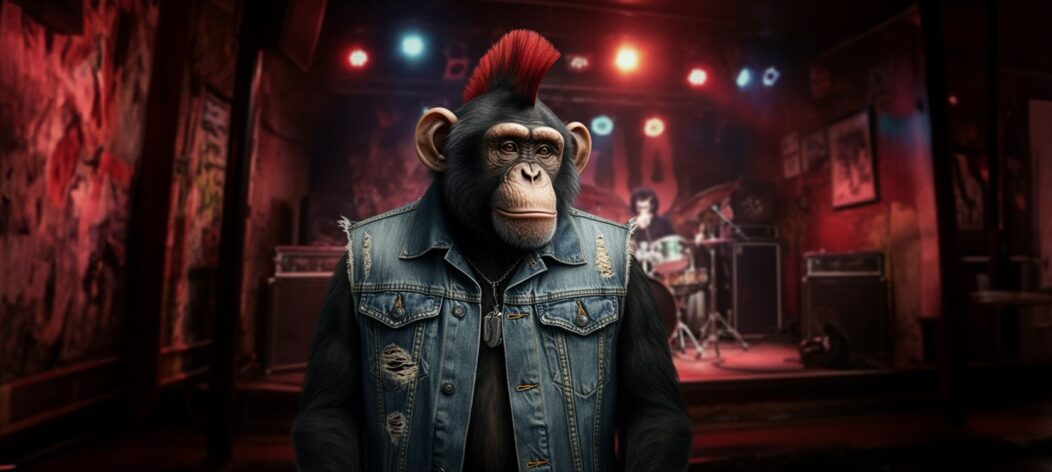

By Billy Hamilton-Stent
I’ve never had much time for Robbie Williams. But I’ve just watched the trailer for his new biopic Better Man five times.
For my sins, I’m a music snob. I like jazz. I can list every Beatles album in order of release and in order of recording. I’ve got rare vinyl. I even have guitars hanging on my wall. What a tit.
So I’d never watch a Robbie Williams biopic. It is simply beneath my musical station – even though 90s nostalgia alone should get me half interested.
I recall a recent fly-on-the-wall Netflix documentary about ‘Rob’ that held my attention for about 10 minutes until the reflective, pop-star ego-treacle turned my tummy.
But I am going to watch Better Man, and I’m pretty sure I’m going to enjoy it. Why?
Well, Robbie is portrayed as a CGI Monkey in a human world.
It sounds like him. It moves like him. And it tells a powerful story in five seconds flat. The idea was conceived by Director Michael Gracey after hearing Robbie describe himself as a monkey [prankster, puppet, buffoon etc] when they discussed the approach to the movie.
In being bold and creative, this simple pivot disrupts a noisy market. Like all good insights, there is a very real method in the madness. By portraying the artist as he sees himself, rather than fretting about getting an actor to ‘ape’ the real performer, the viewer gets a third person and first person perspective. The gimmick – and that’s of course what it is – sweeps aside the tricky issues of biopic complexity, instantaneously. Add on a few layers of special effects and you’ve got yourself a huge hit, I expect.
And in that, there is a giant marketing lesson, made even more giant in the spluttery world of B2B. Creativity solves problems and creates hooks. What more could anyone ask from marketing? Do those two things well and the rest is easy.
But creativity will feel a bit uncomfortable most of the time, especially in realms of enduring orthodoxy. Businesses that have to sell to other businesses don’t like surprises, they like sure bets and security. No time for monkeying around.
Unfortunately, B2B marketing is awash with sameness. For some reason, businesses can’t get used to the idea of differentiation because they are welded to convention.
B2B businesses are fine with a rant. They can call out the ‘death’ of any trend or trope with polemic zeal, but ask ‘em to put some creative skin in the game and they’ll more than likely huff and puff their way to a group decision that errs towards the lowest common denominator and avoids originality – no matter what the brief says.
In fact, groups are where the idea of creativity gets really interesting.
Following on from a recent podcast I contributed to along with Mimi Turner and Jann Schwarz from LinkedIn, the group buyer is seemingly the biggest marketing challenge in B2B. Businesses, especially big ones, buy in groups, and that changes the psychology of decision making. I urge you to listen. It might just change your priority list for next year’s marketing budget.
Hidden buyers represent 50% of the influence in a buying process” Mimi Turner, Head of Marketplace Innovation, LinkedIn LMS. Fellow of the B2B Institute.
In short, the biggest driver of group decisions is familiarity. We buy what we know because it is low risk, and professional reputation is king in B2B. More than price, more than innovation, FOMU [fear of messing up] beats FOMO [fear of missing out] every time.
The double whammy on group buying is that most vendor businesses can’t get to the hidden buyers within groups, many of whom are very influential: FDs, CEO, etc. That is to say, our priority on selling something fast to familiar faces limits our view of the wider market.
The good news is that effective brand-led marketing can solve this problem. Market-level brand awareness connects the widest groups together. Yes, our brand halo has genuine commercial value at the ‘business end’ of B2B decision making. Result!
So, for all the lazer-guided targeting at our disposal to get buyers into funnels, the power of brand can, in the right conditions, generate genuine competitive advantage. And creativity is key to brand attention.
Better Man is a case in point. The marketing challenge for that film is not about getting Take That fanatics to go and watch a movie. They will turn up in droves, regardless. Real success is getting cut through into groups you struggle to reach. For example, music snobs that think Angels is shit.
Make Robbie Williams a monkey and my prejudice is swept aside. I am all ears. And this is thanks to bold and simple creativity without a business benefit or call to action in sight.
So, next time you attend an agency pitch and feel that pinch of unease at a bright idea, one that ‘just wouldn’t work in our sector’, or that would present ‘stakeholder buy-in challenges’, get your monkey out. Take a risk in the name of extraordinary ambition. Because in B2B, being different makes a difference.
The latest (and most useful) B2B insight, delivered to your inbox.
Publicis Pro needs the contact information you provide to send you the latest B2B insights. You may unsubscribe from these communications at anytime.